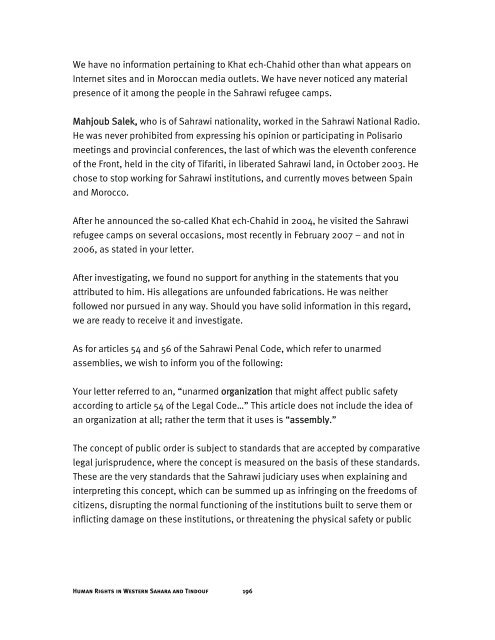Download full report with cover - Human Rights Watch
Download full report with cover - Human Rights Watch
Download full report with cover - Human Rights Watch
You also want an ePaper? Increase the reach of your titles
YUMPU automatically turns print PDFs into web optimized ePapers that Google loves.
We have no information pertaining to Khat ech-Chahid other than what appears on<br />
Internet sites and in Moroccan media outlets. We have never noticed any material<br />
presence of it among the people in the Sahrawi refugee camps.<br />
Mahjoub Salek, who is of Sahrawi nationality, worked in the Sahrawi National Radio.<br />
He was never prohibited from expressing his opinion or participating in Polisario<br />
meetings and provincial conferences, the last of which was the eleventh conference<br />
of the Front, held in the city of Tifariti, in liberated Sahrawi land, in October 2003. He<br />
chose to stop working for Sahrawi institutions, and currently moves between Spain<br />
and Morocco.<br />
After he announced the so-called Khat ech-Chahid in 2004, he visited the Sahrawi<br />
refugee camps on several occasions, most recently in February 2007 – and not in<br />
2006, as stated in your letter.<br />
After investigating, we found no support for anything in the statements that you<br />
attributed to him. His allegations are unfounded fabrications. He was neither<br />
followed nor pursued in any way. Should you have solid information in this regard,<br />
we are ready to receive it and investigate.<br />
As for articles 54 and 56 of the Sahrawi Penal Code, which refer to unarmed<br />
assemblies, we wish to inform you of the following:<br />
Your letter referred to an, “unarmed organization that might affect public safety<br />
according to article 54 of the Legal Code…” This article does not include the idea of<br />
an organization at all; rather the term that it uses is “assembly.”<br />
The concept of public order is subject to standards that are accepted by comparative<br />
legal jurisprudence, where the concept is measured on the basis of these standards.<br />
These are the very standards that the Sahrawi judiciary uses when explaining and<br />
interpreting this concept, which can be summed up as infringing on the freedoms of<br />
citizens, disrupting the normal functioning of the institutions built to serve them or<br />
inflicting damage on these institutions, or threatening the physical safety or public<br />
<strong>Human</strong> <strong>Rights</strong> in Western Sahara and Tindouf 196


